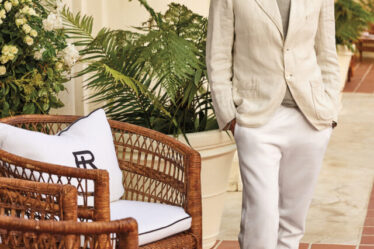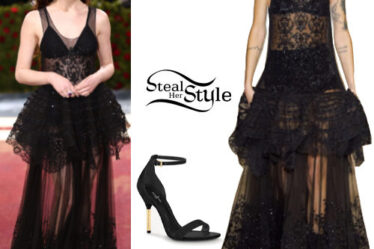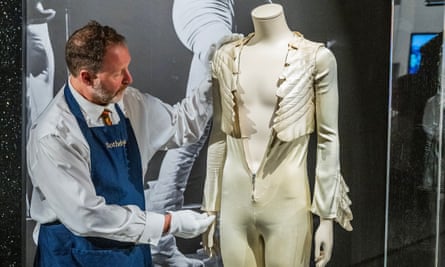
As the frontman of Queen, Freddie Mercury’s musical legacy is undisputed – the band had more than 50 UK Top 40 hits across three decades. But, as an auction and exhibition opening this week at Sotheby’s details, the singer was a style leader too.
Freddie Mercury: A World of His Own is made up of the contents of his home, Garden Lodge – he left the property and everything in it to his close friend Mary Austin when he died in 1991, and she has decided to sell the contents. It includes 30,000 items, everything from the baby grand piano used to compose Bohemian Rhapsody to his personal Polaroids, original song lyrics, and paintings and drawings by artists including Goya and Salvador Dalí. It is his clothing that dominates the exhibition rooms of Sothebys, with more than 200 items on display.
The first room features the fantastical outfits he wore to perform, or at parties. These range from the jacket Mercury wore for his first photoshoots with Queen in 1970 to a short red sequined catsuit worn at Wembley in 1978 and a biker jacket and red leggings worn on Saturday Night Live in 1982. Elsewhere, fans will appreciate grubby ballet shoes and teeny tiny leotards worn on stage, while there are pieces by designers including Zandra Rhodes and David Emanuel (who made Princess Diana’s wedding dress) for fashion historians.
The collection includes the clothes Mercury wore when he was off duty too. One of the rooms is designed to mirror his walk-in wardrobe. It features T-shirts, curios such as a waistcoat with paintings of his six cats, including his favourite, Delilah, and a blue gabardine suit he wore for one of his last public appearances, at the Brit awards in 1990.
The first room showcases Mercury’s extensive kimono collection. Bought in Japan, he often wore them at home – a selection of Polaroids shows him, the actor Anita Dobson and friends wearing them at Garden Lodge.
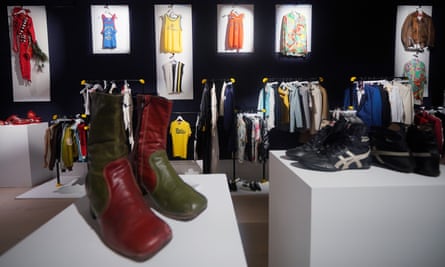
The pieces were collated by Carey Wallace and Sarah Hodgson, experts in rock’n’roll memorabilia. The duo say that Mercury’s attention to image and clothing can be seen in details, such as a ballet cardigan that he hand-stitched with sequins. “He was always interested in his image and he had a very fixed idea about how he wanted to be seen,” says Hodgson.
Wallace points to a flared black and white top by Rhodes that Mercury wore in 1974. “He was so clever, he wore these [black and white] trousers with it – the white leg is coming underneath the black drape. It looks really dramatic on stage.”
Mercury’s fashion knowledge came from his pre-fame career. He was the proprietor of a secondhand stall at Kensington Market with Roger Taylor (who went on to be Queen’s drummer), and shop assistant for Alan Mair, the go-to designer for glam rock platform boots – famously fitting David Bowie with a pair. Even pre-fame, his personal style was notable. “He was sort of ahead of his time,” says Hodgson. “He would wear vintage women’s jackets.” One of these – on display here – forms part of the outfit in the influential Bohemian Rhapsody video.
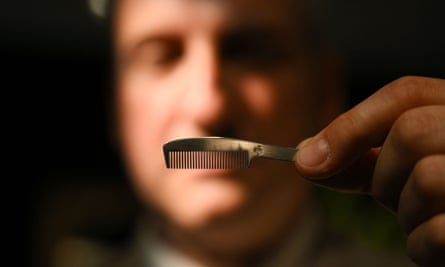
Wendy de Smet designed some of the most memorable pieces on display – including a white catsuit with quilted wings on the ankle. Designed to look like the god Mercury, it was worn for the A Night at the Opera tour in 1975, and the Bohemian Rhapsody video. She remembers: “He was just absolutely meticulous with every single detail,” even providing her with the fabric, an early version of stretchy Lycra, because, he said, “I’m going to be moving around a lot”. He requested that the design be as tight as possible at fittings – De Smet used quadruple stitches on the seams to ensure no wardrobe malfunctions.
Mercury was part of a group of men in rock in the late 60s and 70s who wore flamboyant outfits, Bowie, Jimi Hendrix, Elton John and Marc Bolan included.
after newsletter promotion
While they might have had some resistance from the establishment at the time, Hodgson says a new generation appreciates the experimentation: “Freddie did this whole androgynous look – he wore makeup, he dressed in women’s clothes. I think young people really relate to that.” Harry Styles is one current star who has namechecked Mercury as an influence.
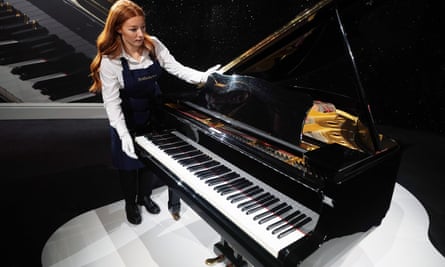
At the end of the 70s, Mercury moved away from the catsuits to a tougher look, featuring red vinyl trousers and a leather jacket. “He was very influenced by the New York nightclub scene,” says Hodgson. Although he never publicly came out, in the 80s Mercury would signpost his sexuality more. His look – a leather jacket, moustache and military cap – would have been seen on the gay scene at the time. He also publicly wore a vest from the Mineshaft, a gay leather club in New York, which is included in the collection. “It’s like a language, isn’t it?” says Hodgson. “You communicate [something] without saying it.”
Whatever message Mercury was transmitting, his use of clothing, as seen here, demonstrates his sophistication as a performer – and adds to his legacy. “He knew exactly what he wanted to look like,” says De Smet. “[It was a] different persona to when you met him. [He was] a quite quiet, sort of unassuming person. He just became this character – he was like an actor, really.”

